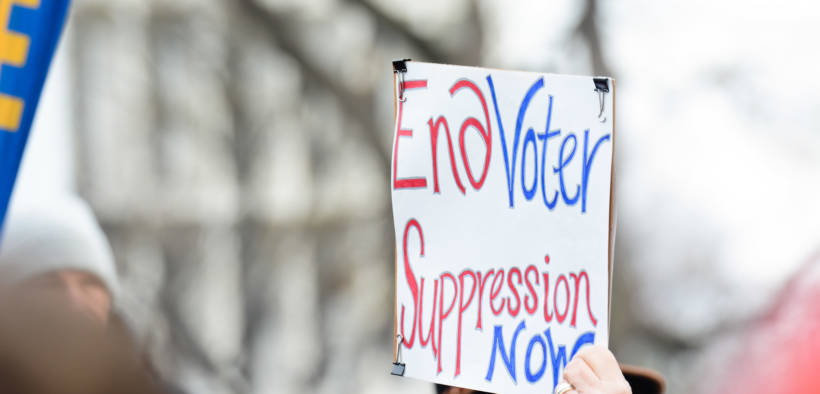Two Key 2020 States Could Ramp Up Vetting Absentee Ballots

After much delay, GOP-led legislatures in Michigan and Pennsylvania may act. But they are offering less than what Democrats seek—and what other GOP-led battleground states do.
Republican-led legislatures in Michigan and Pennsylvania may soon pass bills to allow local election officials to start processing what is expected to be a historic volume of absentee ballots cast in their states before 2020’s Election Day on November 3.
The legislation could reduce a lengthy vote-counting process in the two presidential battleground states, which some political observers have described as one possible nightmare scenario. But the GOP-authored bills fall short of what Democrats have sought. In Pennsylvania, Gov. Tom Wolf, a Democrat, has threatened to veto the changes unless they give more time for voters to apply for absentee ballots, more options for voters to return them, and more time for officials to process them.
“The governor plans to veto [the bill] in its current form for a multitude of reasons, including the fact that the bill makes it harder, not easier, for citizens to vote,” Lyndsay Kensinger, Wolf’s press secretary, told the Morning Call newspaper.
Without such legislation, however, vote counting in this election’s two top swing states would likely take several additional days after Election Day. That timetable is based on how long it took the most populous jurisdictions in both states to count absentee ballots during this summer’s primaries. The delays came after more voters cast absentee ballots than voted at polling places due to COVID-19, which was unprecedented and set records in both states.
Since Labor Day, there have been signs that Republican leadership in Michigan and Pennsylvania would move legislation to allow the earlier processing of absentee ballots. The ballots would be counted by scanners on Election Day, while their return envelopes would be vetted beforehand.
In Michigan, Senate Majority Leader Mike Shirkey said the body was working to “finesse” a bill that he has kept on hold since May to allow the ballot processing to begin one day before Election Day.
In Pennsylvania, the state’s House passed a bill on September 3 to allow the processing to begin three days before Election Day. The bill, approved by a Senate committee on September 8, bans the wide use of absentee ballot return drop boxes before Election Day. Earlier this year, President Trump’s reelection campaign and the Republican National Committee sued to limit using drop boxes as statewide election officials had proposed. In late August, a federal court stayed the case, saying the Republicans had no proof their use would prompt illegal voting.
This landscape, where negotiations between the parties may lead to a compromise, has led two former governors from both states to issue a joint statement on September 9 encouraging their legislatures to act to allow the earlier processing of absentee ballots.
“We know we’re unlikely to have results on Election Day, and that is okay,” said Democrat Jennifer Granholm of Michigan and Republican Tom Ridge of Pennsylvania, writing as national co-chairs of VoteSafe, a bipartisan coalition of election officials and pro-voter groups.
“One adjustment [that] we know based on the primaries will help is lifting the restriction on election officials from beginning to process absentee ballots prior to Election Day,” they said. “While many states go so far as to count ballots prior to Election Day, there is no reason to prevent at least opening envelopes, verifying signatures, and stacking ballots so they’re ready to be counted right away.”
Those administrative steps and others, to verify that the voter’s credentials are correct and ensure that the ballot sent to that specific voter has been returned by them, are the most laborious and time-consuming steps in the behind-the-scenes process of accepting absentee ballots before the actual counting of votes occurs. Taking the hand-marked ballot cards out of their secrecy sleeves and running them through scanners to count votes takes far less time and can be done quickly.
“Processing a mail ballot is not the same as counting it,” said Phil Keisling, the former secretary of state of Oregon and Democrat who oversaw the state’s shift to mail-based voting in 2000. “Processing is doing everything short of counting it.”
Nationally, most states, including other presidential battlegrounds, will start processing returned absentee ballots before Election Day. (See this state-by-state chart by RepresentUs.) For example, Florida will start processing its absentee ballots 22 days before November 3. Arizona will start processing 14 days out. North Carolina, which has already begun to mail out ballots, can process them upon their return. Georgia can also process them upon their return. But New Hampshire, like Michigan and Pennsylvania, cannot, under current state law, start before Election Day on November 3.
In Michigan and Pennsylvania, both must-win presidential swing states, processing absentee ballots has become an increasingly partisan issue in recent months.
“We have long been vocal in our calls for the legislature to change the law around processing times,” said Tracy Wimmer, director of media relations for Michigan Secretary of State Jocelyn Benson, a Democrat.
In Michigan’s Senate, GOP Majority Leader Mike Shirkey has let a bill to start processing the returned ballots one day before Election Day languish, saying that starting to vet the ballots could lead to premature counting. However, in remarks to the Associated Press, he said that there could be some relief for this fall’s election.
“It wouldn’t surprise me that we get enough support to do something before the general election and then evaluate it afterward,” Shirkey told the AP. (The bill was proposed by a GOP state senator, Ruth Johnson, who previously was Michigan’s secretary of state.)
In Pennsylvania, the question of when the processing of ballots could begin was one of several issues in a bill that Republican legislative leaders have been pushing. The GOP-written bill passed by the House and just approved by a Senate committee contains other voting changes that are opposed by the state’s Democrats including Gov. Tom Wolf.
That bill, which passed the Pennsylvania House on September 3, would allow absentee ballot processing to start three days before Election Day polls open. (The Democrats wanted up to three weeks.) The bill also rolls back the absentee ballot application deadline by one week to 15 days before Election Day and bans the wide use of ballot return drop boxes. Instead, it would allow voters to drop off their mail-in or absentee ballots at their polling place on Election Day.
Former governors Jennifer Granholm and Tom Ridge encouraged the lawmakers to empower local election officials to start processing returned absentee ballots before November 3, while downplaying the partisan benefits from processing the returned absentee ballots before Election Day.
“There is a lot at stake in this year’s election, and it makes sense that dramatic changes in [the] process could be met with trepidation,” Granholm and Ridge said. “But these targeted changes are not that; instead, it’s an acknowledgment of the impact COVID-19 has had on all the other aspects of our lives and this limited administrative change is a smart action to prepare our election systems for this new reality.”
This article was produced by Voting Booth, a project of the Independent Media Institute.







